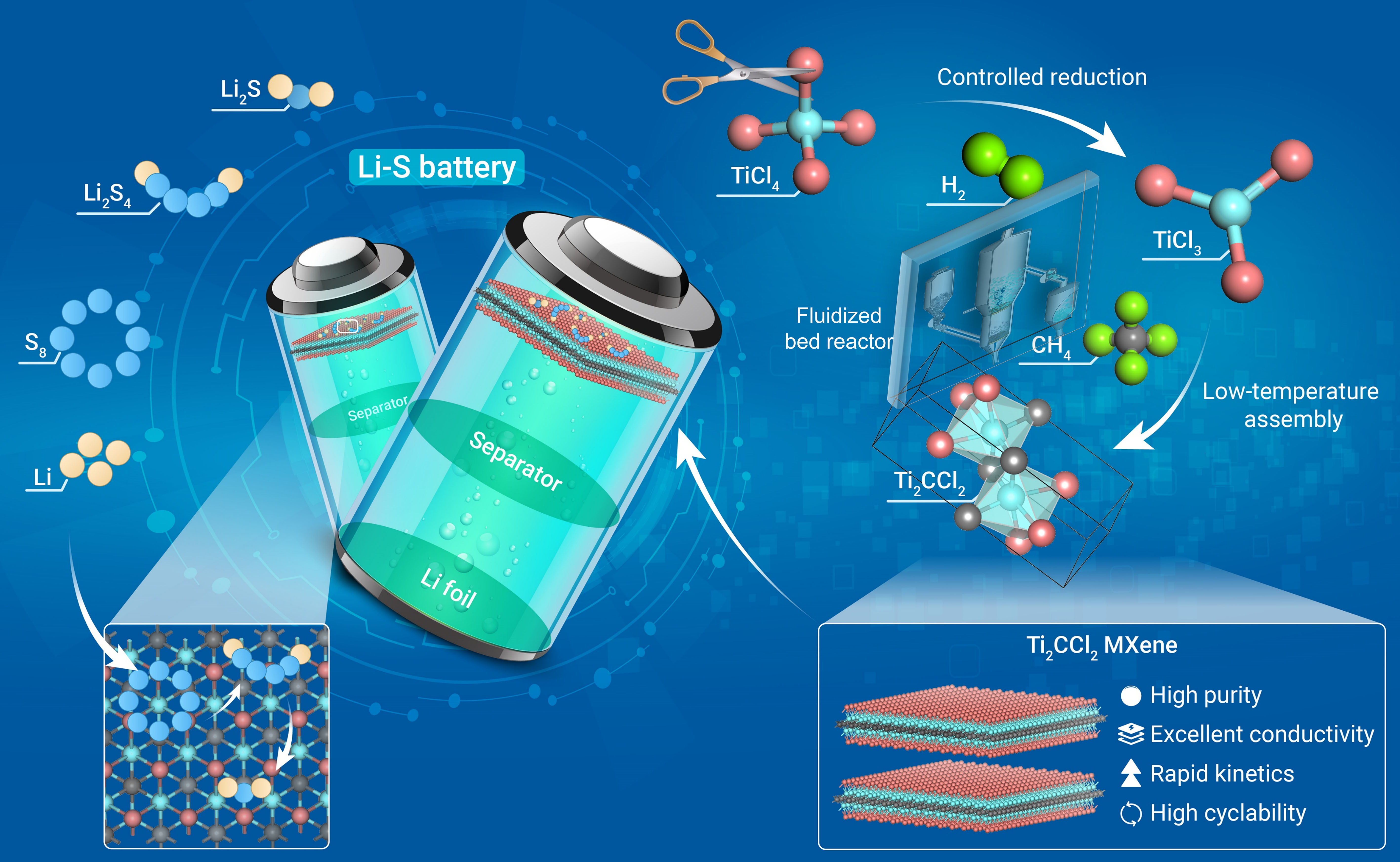A team led by Prof. ZHU Qingshan from the Institute of Process Engineering (IPE) of the Chinese Academy of Sciences has developed a gas-phase synthesis method using a fluidized bed reactor (FBR) for the production of Ti2CCl2 MXene, and elucidated the synthesis and catalytic mechanisms facilitating the conversion of polysulfides. The as-synthesized Ti2CCl2 MXene has been shown to prolong the cyclability of Li-S batteries. The study was published in The Innovation (DOI: 10.1016/j.xinn.2023.100540).
MXenes, as the "wonder" of two-dimensional (2D) materials, have attracted great attentions because of their potential to solve many energy and environmental problems. They are mainly synthesized by etching the costly parental MAX phases, and some M atoms are also inevitably etched during the synthesis process, resulting in cation defects and low stability—factors that have significantly impeded their real-world application. Economic and efficient synthesis of high-quality MXenes is a prerequisite for industry-scale applications.
The recently developed direct gas-solid synthetic route and chemical vapor deposition method both suffer from mass transfer limitations, necessitating extended synthesis durations, high temperatures of up to 950 °C and contending with impurity phases such as TiC. A transformative synthetic approach is thus in high demand.
In this study, high purity and stable Ti2CCl2 powder were fabricated by economical TiCl3 and CH4 in an FBR at 770 °C. The thermomechanical analysis of the Ti-C-Cl ternary system indicated that the formation mechanism of Ti2CCl2 is primarily governed by electronic energy rather than entropy. By tuning the chemical potentials of Ti, C, and Cl, it was possible to obtain the region where pure-phase Ti2CCl2 can be formed.
The as-synthesized Ti2CCl2 demonstrated superior metallic conductivity and the potential to significantly boost the conversion kinetics of polysulfides. Owing to the coordination of Cl ions, the attraction of Li2S4 toward Ti2CCl2 was finely tuned to an appropriate level so that polysulfide conversion was accelerated without compromising the progress of desorption. Hence, the Ti2CCl2 showed excellent catalytic performance and prolong the cyclability of Li-S batteries.
"We believe that the fluidized bed gas-phase synthesis technique offers a great opportunity to take MXenes from laboratories to industry-scale applications. The synthesis temperature and the titanium source cost have been reduced by approximately 200 °C and two orders of magnitude, respectively. More importantly, the in-depth mechanistic analysis deciphers the origin of the formation of Ti2CCl2, opening an avenue for mass production of other MXenes in an efficient and cost-effective way," said Dr. XIANG Maoqiao, first author of the study.

Schematic diagram of the synthesis of Ti2CCl2 and the catalytic process of the conversion of polysulfides (Image by XIANG Maoqiao)
Media Contact:
LI Xiangyu
Public Information Officer
Institute of Process Engineering, Chinese Academy of Sciences, Beijing 100190, P. R. China.
E-mail:xiangyuli@ipe.ac.cn
Tel: 86-10-82544826
 Search
Search




 京公网安备110402500047号
京公网安备110402500047号